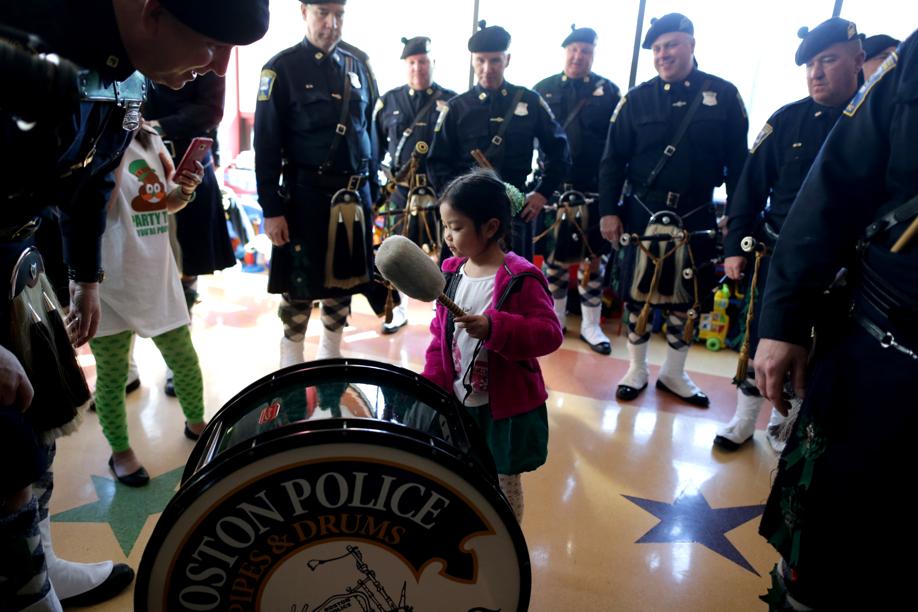
Bagpipes demand time. They require deep breath and deep dedication.
On ancient battlefields, they reverberated as signals to warriors. During parades, they’re anticipated. At funerals, their mournful sounds have carried spirits to the hereafter.
In the Boston Police Gaelic Column of Pipes and Drums — marking its 25th anniversary this year — they’ve forged friendships.
“That instrument can reach in and touch your soul,’’ said Officer James Barry, drum major and founding member. “If you’re playing it poorly, it is a bag of cats.’’
In either case, it brings you to tears. He laughed.
Bagpipes are unforgiving, he said. If you put them down for a week, you regress.
So for more than two decades, the group has honed its skills, practicing for thousands of hours, spending time and money to go from beginners to masters of their craft. In the process, they became what is believed to be among the first police bagpipe bands in New England, setting the foundation for bands that came after in Connecticut, New Hampshire, and Rhode Island. They’re volunteers who make it to practice once a week in the basement of St. Mark Roman Catholic Church in Dorchester.
“It’s a testament to the group that everybody pitches in and keeps the spirit of the band alive,’’ said Sergeant Joe Cheevers, a founding member.
This is high season for the bagpipers. Friday, they were at Franciscan Children’s hospital. Sunday, they’re set to march in the South Boston St. Patrick’s Day parade.
They formed in 1992 to honor a fallen friend. In 1991, Officer Jeremiah Hurley was killed in the line of duty while defusing a bomb in Roslindale.
The New York transit police band was asked to perform at Hurley’s funeral.
“I was shocked that Boston, with its deep Irish roots, didn’t have its own police bagpipe band,’’ Barry said.
In a time of pagers and pay phones, a notice was faxed to the Boston Police Department about starting a local band. A longtime firefighter told Barry that with the lone wolf culture of police officers, this band would never get off the ground. Then, Barry pulled into Doyle’s Cafe in Jamaica Plain for the first band meeting and found nearly 100 officers waiting.
He knew then he had the makings of a band. Sergeant Pat Morrison joined in 1996. By then, they were pretty decent. But at first?
“In the very beginning, we were horrible,’’ he said. “We sounded like two cats fighting in an alley and maybe that sounded better than we did.’’
The road to proficiency meant instructors and practice. Morrison described them as nomads in 1992, smashing bagpipes against each other, making sounds.
Eventually, those sounds turned into something people recognize, he said.
“We’ve come a long way from playing in church parking lots and learning how to march,’’ he said. “You’ve got to be in step, or you look like an untamed army.’’
The band formed before the members were married. Their families formed around the band. Kaitlin Pellerin, one of Barry’s daughters, had the bagpipers at her wedding. So did her sister. They had cookouts on the beach and grew up with traditional Irish music. Every year, her kids, Liam and Nora, take a picture with their grandfather on St. Patrick’s Day in his band uniform. The Gaelic Column’s kilt is navy blue, a nod to their profession.
“In this family, St. Patrick’s Day is bigger than Christmas,’’ she said. “It’s been very special to grow up with all these cops in kilts.’’
They’re in high demand. This year, they’re also making stops at MIT, Faneuil Hall, and pubs in Boston. They’ve played with the Dropkick Murphys and Joey McIntyre, performed in front of national audiences at the 1999 Ryder Cup and at Boston Celtics playoff games, and were the first US bagpipe band to win “Best Bagpipe Band’’ and “Best Entry’’ in a St. Patrick’s Day parade in Ireland. They went from novice musicians to masters of their craft.
Sunday’s parade is hardly their last stop: The following weekend, they’re off to Quebec City for the parade there.
“You know you’re friends when you call them and say, ‘I need help moving’ and they show up,’’ Morrison said.
“We’ve got each other’s backs. The common interest in this music binds us together.’’
He remembers singing Irish songs with his father. His grandmother would play them on the record player. Her Southie home was on the parade route.
He knew what the songs were supposed to sound like 21 years later when he decided to learn to play the bagpipes. It took determination and repetition to burn this skill into his muscle memory.
The band performed in Virginia at memorial services for 31 American servicemen, including 17 Navy SEALs, who died when their helicopter was shot down over Afghanistan in 2011, and, more recently, for Navy SEAL William “Ryan’’ Owens, who was killed in Yemen, in January.
Morrison will never forget when a SEAL walked up to him and said: “You know I hate the bagpipes.’’
Morrison was thrown, but then he looked in the man’s eyes and understood.
“Every time I hear you guys, another one of my friends is dead,’’ the SEAL explained.
It’s humbling, band members say. It’s an honor and a responsibility.
“There’s no doubt about that — we have buried so many police officers in the line of duty over the years,’’ Barry said.
“You know that’s the tough part. You have to be at your best and help that family get through a very difficult time. I think the music of the bagpipes helps with that, too.’’
Cristela Guerra can be reached at cristela.guerra@globe.com. Follow her on Twitter @CristelaGuerra.



